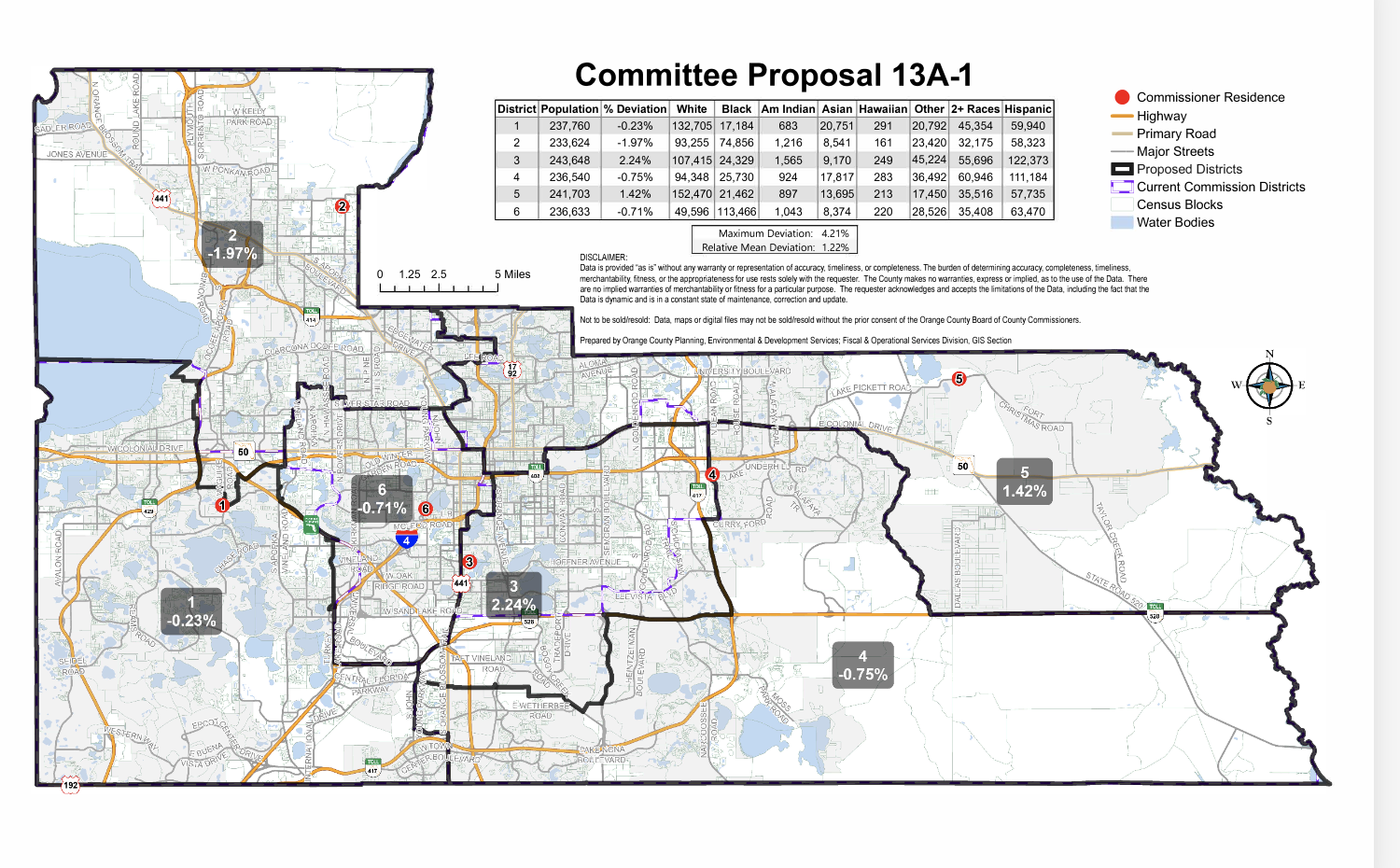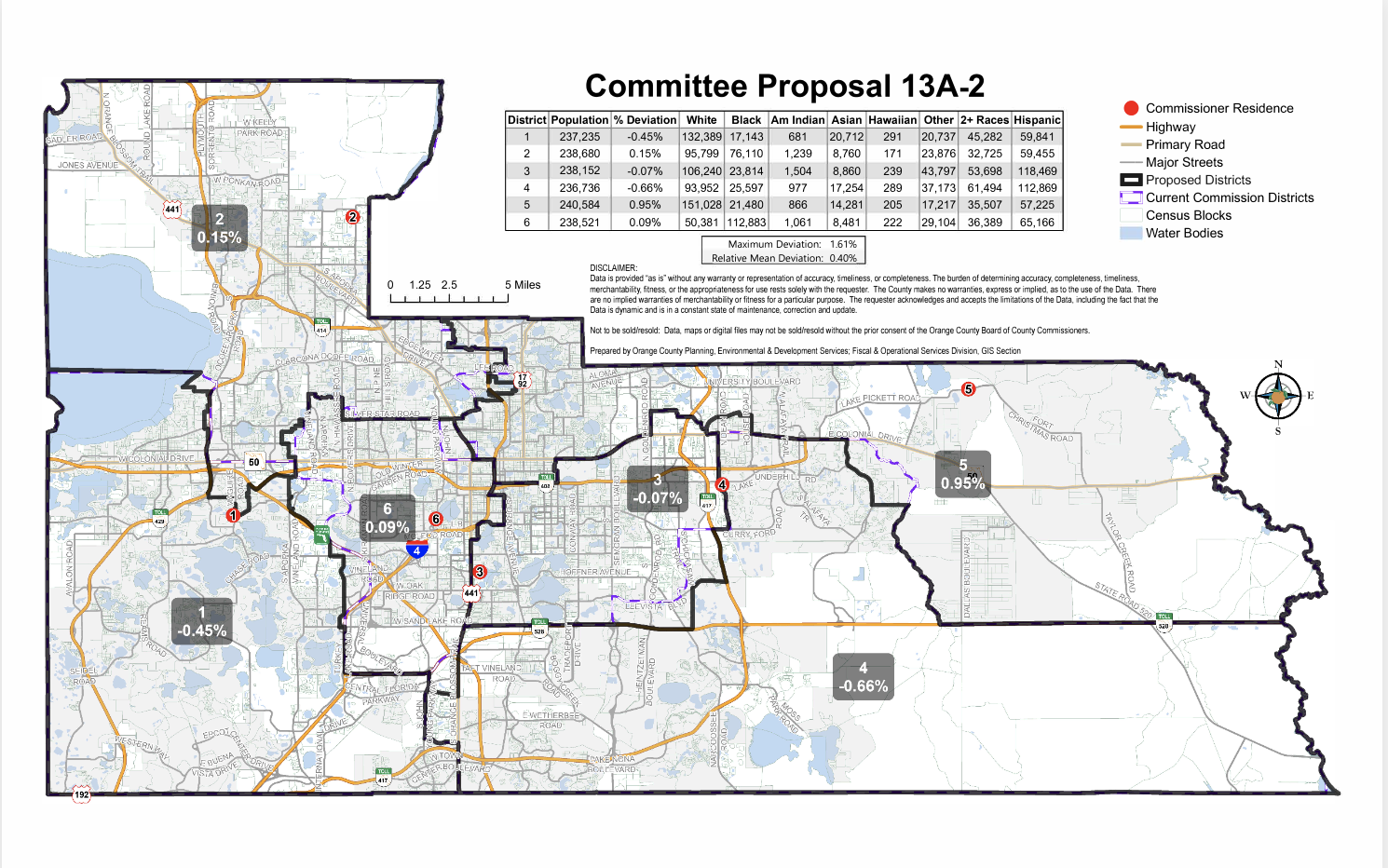- April 4, 2025
-
-
Loading

Loading

Every 10 years, the six districts for the Orange County Board of County Commissioners must be studied and updated to ensure balanced representation for all residents. This redistricting is the constitutionally mandated redrawing of local, state and federal political boundaries following the federal Census to account for growth and changes in population during the previous decade.
The goal of redistricting is to readjust the population between commission districts so no Orange County commissioner is representing substantially more individual residents than the other commissioners.
Creating the biggest challenge to forming equal districts has been Horizon West, in District 1, and Lake Nona, in District 4, because those communities grew exponentially, said Jason Reynolds, Orange County Neighborhood Services Division manager. An Advisory Committee for Redistricting was formed to study the entire county and recommend to the BCC changes in district lines to accommodate lop-sided growth.
The process must be completed by March — at the end of the legislative session — when the BCC selects a modified version of the map proposed by the advisory committee. It will be effective for elections in 2022.
THE PROCESS
Orange County formed a Redistricting Project Team, which consisted of personnel from the Neighborhood Services Division, the County Attorney’s Office, Fiscal and Operational Support Division, Communications Division, and the Supervisor of Elections Office.
The mayor and each county commissioner appointed residents to an advisory committee. This group was tasked with reviewing the decennial census data, as well as proposing and analyzing maps reflecting various adjustment options to the commission district boundaries. These maps will then be presented to the BCC for consideration and adoption.
Zach Hoover was one of two advisory committee members selected by District 1 Commissioner Nicole H. Wilson. He was interested in serving on the committee because of prior experience.
“I worked on redistricting issues as a staffer for the Pennsylvania State Senate, so I am familiar with how important the process is to ensure residents are fairly and equally represented,” Hoover said.
It was an interesting process, he said, and he leaned on the expertise and guidance of the other committee members and county staff. He said the experience was “humbling and incredibly valuable.”
District 1, which encompasses most of West Orange County, likely will see the most change. Hoover said he heard from several residents who live in unincorporated areas of the county who do not have elected municipal governments.
“They expressed concerns that their communities might be split between districts in favor of keeping municipalities together,” Hoover said. “We also heard from Ocoee residents who advocated for uniting Ocoee into one district, rather than continuing to divide it between districts 1 and 2. The committee took community feedback very seriously, and I think that's reflected in the maps we recommended to the Board of Commissioners.”
Hoover admitted he is part of his district’s population explosion because he and his family moved to Horizon West from Southern Pennsylvania four years ago.
Wilson also appointed Ruthanne Connor King, longtime president of the Hunter’s Creek Homeowners Association. Wilson said she took a nonpolitical approach to selecting her representatives.
She said the retired businesswoman had a pragmatic approach to the process, while Hoover understood the constitutional principles at play.
The committee met regularly from September to mid-December in the County Commission Chambers, as well as in each of the six commission districts, and used a maps program to draw and redraw the lines, redefining district boundaries from all angles.
In developing its recommendations, the committee took into consideration the demographics of the county, the geography of the neighborhoods, existing precinct lines and community interests.
“Each meeting we were reviewing maps, some more than others, and, say, we had four maps at a meeting — they would discuss them one by one and decide if this map makes it to the end of the process,” Reynolds said.
Several committee members submitted map proposals for what they thought the districts would look like, Reynolds said.
“They would draw it based on what they heard from the community, what they heard from the public, maybe some of them drew based on numbers. Someone said, ‘I want the map to be as least disruptive as possible,’ so they balance the districts without disrupting as many people.”
Overall, members reviewed 20 maps and recommended two for further consideration. Those will be presented to the BCC later this month, where commissioners will discuss the options and either choose one or some variation of one.
LEARNING PROCESS
Throughout the process, residents had access to a county website set up to offer a convenient way to review all aspects of the redistricting effort, including agendas and minutes, maps and census data. Public participation and input was encouraged, and residents were invited to attend in-person and virtual meetings to voice their opinions on how they thought the lines should be drawn.
Wilson attended all of the meetings, she said, and she learned things from residents. She originally thought all communities wanted to be in one district, but Pine Hills residents preferred dual representation in two districts, 2 and 6.
She also discovered some of the folks who encouraged her to run could possibly be redistricted.
Wilson said the advisory committee members took their role seriously and were passionate about maintaining equality, sometimes taking the meetings late into the night.
“Nobody’s going to be totally happy about where those (boundaries) land, but I felt like the committee ultimately made a good recommendation,” she said. “District 1 (saw) a huge population growth, but there also was growth in Oakland, Ocoee and Winter Garden, too – overall population growth throughout the district.”
In both map options, Winter Garden, Oakland and the community of Tildenville remain in District 1.
“I think the idea of keeping Oakland with Winter Garden was a good recommendation,” she said. “I think it’s a benefit to have that singular point of contact with smaller communities. … On a personal level, I would have liked District 1 to include going up to Colonial (Drive) in the Ocoee area, but there was a lot of input from Ocoee wanting to be in one district,” Wilson said.
Ocoee currently is split between Wilson’s District 1 and Christine Moore’s District 2.

